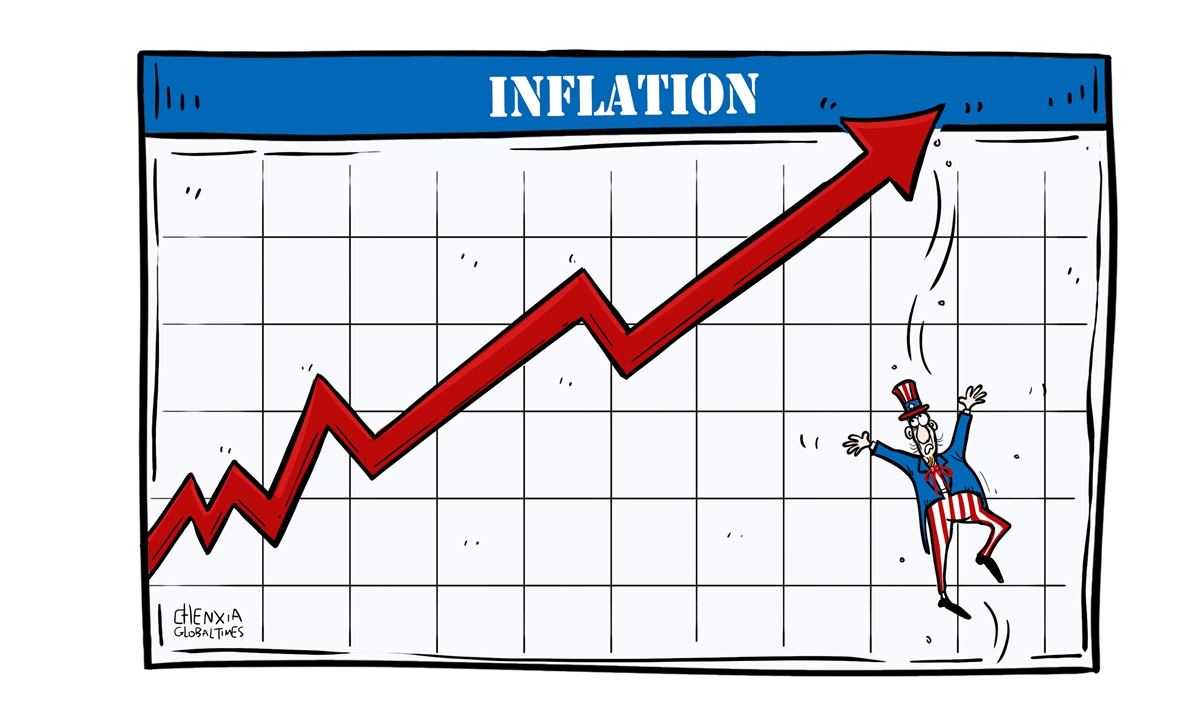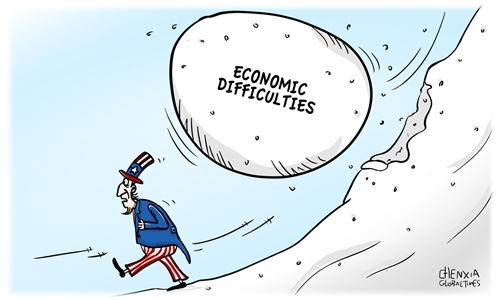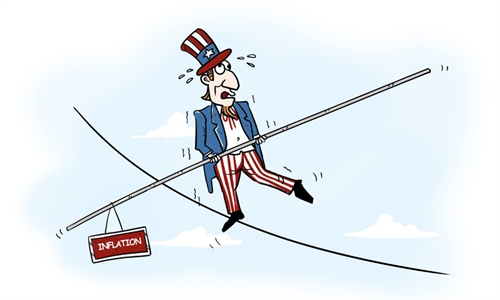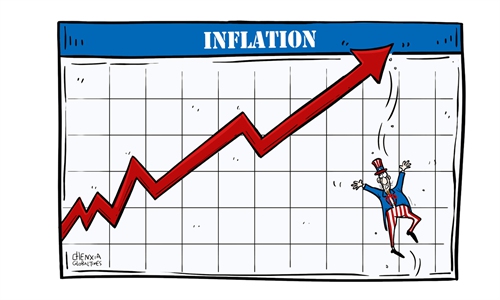
Illustration: Chen Xia/GT
As the prices of oil, natural gas, non-ferrous metals, semiconductor microchips and food keep rising - such as the crude oil price hitting more than $130 per barrel, the picture looks increasingly dim for the US which is reeling from 7.5 percent inflation in January.It is really possible that inflation in the US could keep rising and may top 10 percent in the coming months, if the conflict between Russia and Ukraine escalates and Moscow takes drastic measures to reduce or even cut off energy supply to Europe, as a countermeasure to resist the Western world's economic sanctions.
Now, tens of millions of American ordinary wage earners are suffering from inflating prices. However, the White House hasn't hinted it will resort to effective measures to tame inflation. All the more, the Biden administration insists on levying tariffs on imported Chinese goods as a leverage to contain China's economic rise.
It is unlikely for the White House to give up its leverage anytime soon. With the tariffs the former Trump administration imposed on more than $360 billion worth of Chinese imports about to expire, the Biden government is kicking off a review of the punitive trade measures.
It is well known that higher tariffs levied by the US government have driven up commodity prices at the supermarket and at the grocery stores. Also, the cost of American manufacturing plants to churn out products has risen significantly.
As a result, there have been growing calls across the US for the Biden administration to upend its unprecedented tariffs war with China in order to relieve financial burdens on average American households. Nevertheless, the Biden administration's past attitude toward trade with China suggests that the White House is stubbornly reluctant to choose the path that will make trade with China easier by removing the tariffs, first imposed on Chinese imports by the former Trump administration.
The US consumer price index for February is anticipated to hover at 7.7-7.8 percent year-on-year, the highest rate in nearly 50 years and the 10th straight month of inflation above 5 percent. If anything, this is the latest example of how the tariffs imposed on Chinese goods have made American businesses and consumers bear the cost of tariffs in the form of higher prices of imported Chinese products.
None of the results the US government had initially hoped to achieve through the punitive tariffs have materialized. China's goods trade reached $6.05 trillion in 2021, up 30 percent year-on-year and marking a record high. Data from the US Commerce Department showed that US trade deficit with China widened 14.5 percent to $355.3 billion in 2021.
Americans' reliance on Chinese supply chains has not changed the Biden administration's outdated thinking that eliminating the tariffs and calling an end to the reckless trade war will favor China. The US' stubbornness stems from its political environment that prioritizes an ideology-driven zero sum game over practical economic results.
Even though the US government clearly knows that the US economy will continue to suffer from the additional tariffs, it has chosen to bury its head in the sand, in order to avoid public criticism of being seen soft on China.
This year, China's central government work report delivered to the National People's Congress (NPC), the country's top lawmaking body, made no mention of trade with the US, which doesn't mean that China-US trade is no longer important but reflects China's confidence that the bilateral trade that has weathered years of trade war is unlikely to worsen. China will turn more attention to exploring trade with partners of the Regional Comprehensive Economic Partnership (RCEP), while ramping up Belt and Road Initiative construction around the globe.
In 2022, there may not be any significant progress when it comes to China's trade and investment in the US, as the politicians in Washington are largely obsessed in talking how to "decouple" from China. With a strengthening Chinese currency, the yuan, Americans are set to greet more expensive price tags at the shelves. Inflation is almost certain to keep going up, eroding American households' purchasing power. If Americans truly want to air their grievances about inflation, they should ask the officials at the White House and the Congress why the US has chosen trade confrontation with China.
The author is an editor with the Global Times. bizopinion@globaltimes.com.cn



